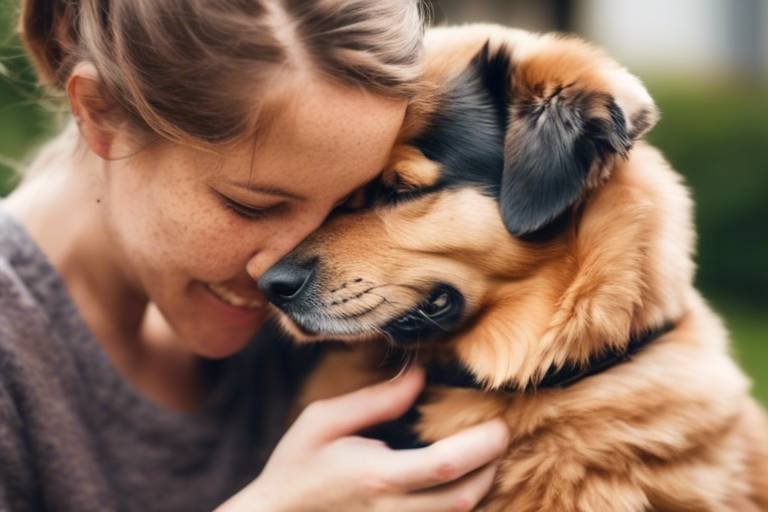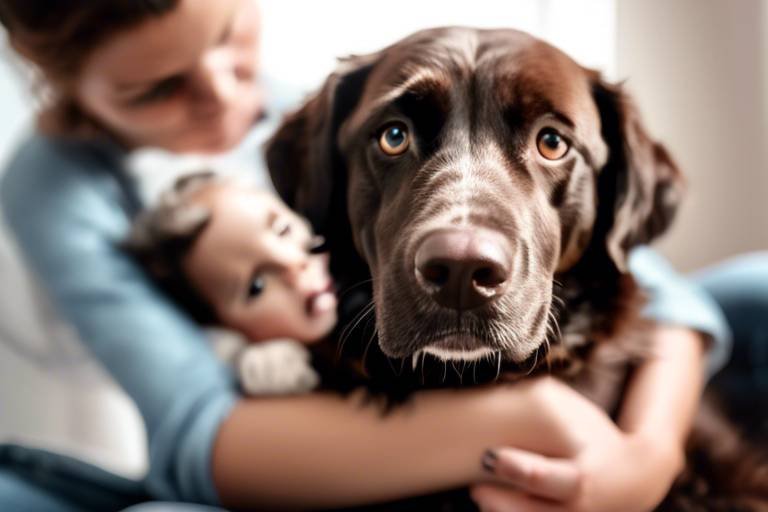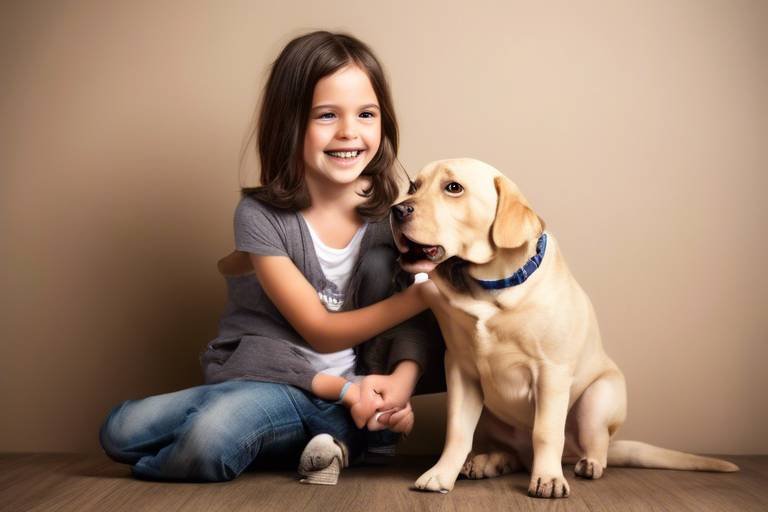The Benefits of Pet Adoption for Mental Health Recovery
Have you ever felt the warm, fuzzy feeling that comes from the companionship of a pet? Adopting a pet can be a game-changer for those on the journey of mental health recovery. It's not just about having a cute face to come home to; it's about the profound impact that these furry friends can have on our emotional well-being. Imagine coming home after a long day, feeling the weight of the world on your shoulders, and then being greeted by a wagging tail or a soft purr. That’s not just a moment of joy; it’s a moment that can shift your entire mood. In this article, we’ll explore how adopting a pet can significantly enhance mental health recovery, providing emotional support, companionship, and a sense of purpose for individuals facing mental health challenges.
Pets offer unconditional love and companionship, which can be a lifeline for those struggling with feelings of loneliness and anxiety. Think of your pet as a silent partner in your recovery journey, always there to listen without judgment. Their presence can help to alleviate the emotional burden that comes with mental health issues. Whether it’s a dog that snuggles up beside you during tough times or a cat that curls up in your lap, these interactions can create a sense of comfort that is hard to find elsewhere. The simple act of petting a dog or cat can release calming hormones, making it a natural remedy for stress.
Owning a pet creates a daily routine that can instill a sense of stability and responsibility in your life. For many, the act of caring for a pet can provide a much-needed structure, helping to combat the chaos that often accompanies mental health struggles. Imagine waking up each morning to the sound of your dog eagerly waiting for breakfast or your cat nudging you for attention. This routine can encourage you to get out of bed and engage with the world around you, which is a crucial step in the recovery process. Establishing a schedule for feeding, walking, and playing with your pet can help to create a sense of normalcy, which is vital for mental health recovery.
Interacting with pets has been shown to lower stress levels significantly. Studies have demonstrated that spending just a few minutes with a furry friend can lead to a noticeable decrease in cortisol, the stress hormone. This is particularly beneficial for individuals recovering from mental health issues, as stress can often exacerbate symptoms. When you play with your pet or simply relax together, your body responds by promoting relaxation and enhancing overall well-being. It’s like having a built-in therapist who never charges by the hour!
Did you know that petting or playing with animals releases oxytocin? This hormone is often referred to as the "love hormone" because it promotes feelings of bonding and affection. The physiological benefits of interacting with pets can lead to improved mood and a greater sense of happiness. It’s a beautiful cycle: the more love you give to your pet, the more love you receive in return, creating a positive feedback loop that can significantly aid in mental health recovery.
Caring for a pet encourages mindfulness, as individuals focus on the present moment. This practice can be incredibly therapeutic for those dealing with anxiety or depression. When you’re engaged in activities like walking your dog or grooming your cat, your mind is often taken away from negative thoughts and worries. It’s a bit like meditation, but with a furry twist! By concentrating on your pet’s needs, you cultivate a sense of peace and presence that can be incredibly healing.
Pets can also serve as social catalysts, facilitating interactions that might not happen otherwise. Walking a dog often leads to conversations with fellow dog owners, creating opportunities to connect and build support networks. This can be especially important for individuals who may feel isolated due to their mental health challenges. By engaging with others in a pet-friendly environment, you’re not just enhancing your social life; you’re also reinforcing your mental health recovery.
Choosing to adopt rather than buy a pet not only saves lives but also aligns with the values of compassion and responsibility. This act of kindness can enhance the adopter's self-esteem and sense of purpose. When you adopt, you’re giving a second chance to an animal that may have faced neglect or abandonment. It’s a powerful reminder that we all deserve love and a fresh start, which can resonate deeply with those on their own recovery journeys.
Rescue pets often come with inspiring stories of survival. These narratives can resonate with adopters, fostering a deeper emotional connection that aids their mental health journey. When you hear about a pet that has overcome adversity, it can inspire you to tackle your own challenges head-on. It’s a beautiful reminder that resilience exists, both in animals and in ourselves.
Engaging with local shelters and adoption events can create a sense of community. This involvement provides social support and shared experiences that contribute positively to mental health recovery. Whether you’re volunteering your time or attending community pet events, you’re not just helping animals; you’re also building connections that can be vital for your own healing process.
- How does pet ownership improve mental health? Pet ownership can provide emotional support, reduce stress, and create a sense of purpose.
- What types of pets are best for mental health recovery? Dogs and cats are popular choices, but small animals like rabbits or guinea pigs can also provide companionship.
- Can pets help with anxiety and depression? Yes, many studies show that pets can help reduce symptoms of anxiety and depression through companionship and routine.

The Emotional Support of Pets
When it comes to the emotional support of pets, the impact they have on our mental well-being is nothing short of remarkable. Imagine coming home after a long, stressful day, only to be greeted by a wagging tail or a gentle purr. This simple act can instantly lift your spirits and make you feel less alone. Pets provide unconditional love and companionship, acting as a soothing balm for the soul. They don’t judge, they don’t criticize, and they’re always there to listen without interruption. This kind of emotional support can be transformative, especially for individuals grappling with mental health challenges like anxiety or depression.
Studies have shown that interacting with pets can significantly reduce feelings of loneliness and anxiety. Just think about it: when you’re feeling down, having a furry friend by your side can remind you that you’re not alone in this journey. The bond formed between humans and their pets is unique and profound, often providing a sense of comfort that’s hard to find elsewhere. Many pet owners report feeling a sense of purpose and responsibility that comes from caring for another living being. This relationship can be incredibly beneficial, as it encourages individuals to focus on something outside of themselves, shifting their perspective away from their troubles.
Moreover, pets can help us express our emotions more freely. For instance, when you’re feeling overwhelmed, talking to your pet can provide an outlet for your feelings. They don’t need to understand your words; they simply offer a safe space for you to vent and process your emotions. This sense of emotional release can be cathartic, helping to alleviate stress and anxiety. In fact, many therapists recommend pet therapy as a complementary approach to traditional mental health treatments. The presence of a pet can create a calming atmosphere, allowing individuals to open up and explore their feelings more deeply.
In addition to emotional support, pets also encourage physical activity. Whether it’s taking your dog for a walk or playing with your cat, these activities can help boost your mood and overall mental health. Engaging in regular physical activity has been linked to improved mental well-being, as it releases endorphins—those feel-good hormones that can create a sense of happiness and contentment. Thus, the emotional support provided by pets extends beyond just companionship; it can also lead to a more active and fulfilling lifestyle.
Ultimately, the emotional support of pets is a multifaceted phenomenon that can significantly enhance mental health recovery. They provide love, companionship, and a sense of purpose, all of which are crucial for individuals navigating the complexities of mental health challenges. Adopting a pet can be one of the most rewarding decisions you make, not just for them, but for your own well-being as well.
- How do pets help with anxiety? Pets can provide companionship and emotional support, which helps reduce feelings of anxiety and loneliness.
- Can having a pet really improve my mental health? Yes, pets can enhance your mood, provide comfort, and encourage physical activity, all of which contribute to better mental health.
- What types of pets are best for emotional support? Dogs and cats are the most common emotional support animals, but other pets like rabbits and birds can also provide companionship and comfort.

Adopting a pet can profoundly influence the mental health recovery journey, primarily through the establishment of a daily routine. When you bring a furry friend into your home, you’re not just gaining a companion; you’re also welcoming a new structure into your life. This routine can be a game changer for individuals grappling with mental health challenges. Imagine the simple yet powerful act of waking up each morning to a wagging tail or a soft purr. It’s like having a built-in alarm clock that nudges you to start your day.
Having a pet means you have responsibilities that are not only essential for their well-being but also beneficial for yours. Feeding, walking, grooming, and playing with your pet can create a sense of purpose that might have been missing. It’s a way to shift the focus from your struggles to the needs of another living being. This shift can be incredibly therapeutic. When you’re caring for a pet, you’re reminded that you are capable of nurturing and providing love, which can enhance your self-esteem and overall outlook on life.
Moreover, the routine associated with pet ownership can instill a sense of stability. For individuals who experience anxiety or depression, unpredictability can exacerbate their symptoms. A pet’s needs create a framework that encourages consistency. For instance, consider the daily schedule of a pet owner:
- Morning walks: A refreshing start to the day.
- Feeding times: Regular intervals that promote responsibility.
- Playtime: Scheduled fun that can lighten the mood.
- Evening cuddles: A calming ritual that enhances relaxation.
In addition, the act of caring for a pet can serve as a reminder to practice self-care. When you prioritize your pet’s needs, you may find yourself prioritizing your own needs as well. It’s essential to take breaks, get outside, and engage in activities that bring you joy. This reciprocal relationship fosters a healthier lifestyle, encouraging you to stay active and engaged with the world around you.
Ultimately, the routine established through pet ownership not only aids in recovery but also enriches life with moments of joy and connection. It’s like having a little cheerleader by your side, reminding you that every day is an opportunity for growth and healing. So, if you’re considering pet adoption, remember that you’re not just saving a life; you’re also creating a pathway to a more structured, fulfilling, and hopeful future.
Q1: How can a pet help with anxiety?
A: Pets provide companionship and unconditional love, which can help alleviate feelings of anxiety and loneliness. Their presence can also encourage physical activity, which is beneficial for mental health.
Q2: What type of pet is best for mental health recovery?
A: While dogs and cats are popular choices due to their social nature, other pets like rabbits or guinea pigs can also provide comfort and companionship. The best pet is one that fits your lifestyle and emotional needs.
Q3: Can adopting a pet really improve my mental health?
A: Yes, many studies suggest that pet ownership can lead to lower levels of stress, increased physical activity, and improved mood, all of which contribute positively to mental health recovery.
Q4: How much time do I need to dedicate to a pet?
A: The time required depends on the type of pet. Dogs typically need more time for walks and play, while cats may be more independent. It's essential to consider your schedule and choose a pet that fits your lifestyle.
When it comes to tackling stress, pets are like little furry therapists that come with a wagging tail and a purring engine. Imagine coming home after a long, exhausting day, and there, waiting for you, is your loyal companion ready to shower you with affection. Just the sight of your pet can trigger a wave of relief and comfort. Studies have shown that interacting with pets can significantly lower stress levels, which is a game-changer for anyone on the journey of mental health recovery.
But how exactly do pets work their magic? Well, the act of petting a dog or cat can lead to a cascade of physiological responses in our bodies. When you stroke your pet's fur, your brain releases oxytocin, often referred to as the "love hormone." This hormone not only fosters feelings of love and bonding but also works to reduce stress and anxiety. It's like having a built-in stress relief system right at your fingertips!
Moreover, the rhythmic act of petting can be incredibly soothing. It’s akin to a gentle meditation; as you focus on the sensation of your pet’s fur and their calming presence, your worries can start to fade away. This is particularly beneficial for those dealing with anxiety or depression, as it encourages a sense of mindfulness. By concentrating on the here and now, you can momentarily escape the overwhelming thoughts that often accompany mental health struggles.
Interestingly, pets can also act as a natural buffer against stressors. For instance, if you're feeling anxious about an upcoming event, your pet can provide a sense of security and comfort, allowing you to face those challenges with greater confidence. It's like having a loyal sidekick who is always there to remind you that you are not alone in your battle against stress.
Furthermore, the simple act of playing with your pet—whether it's tossing a ball to your dog or engaging in a playful game with your cat—can release endorphins, those feel-good hormones that boost your mood. This playful interaction not only distracts you from stress but also fosters a deeper bond with your pet, enhancing your overall emotional well-being.
In summary, the companionship and love that pets offer can significantly reduce stress levels and promote emotional healing. They serve as a reminder that sometimes, the best therapy comes with four legs and a wagging tail. So, if you're looking for a way to alleviate stress in your life, consider opening your heart and home to a pet. You might just find that the benefits go beyond companionship; they could lead to a path of healing and recovery.
- How do pets help reduce stress? Pets provide companionship, unconditional love, and physical interaction that can lower cortisol levels and increase oxytocin, leading to reduced stress.
- Can any pet help with stress reduction? While dogs and cats are the most common pets for emotional support, other animals like rabbits, guinea pigs, and even fish can also provide calming effects.
- Do I need to adopt a pet to experience these benefits? While adoption is a wonderful option, even spending time with friends' or family members' pets can provide similar stress relief benefits.
When we think about the joys of having a pet, our minds often drift to the emotional connections we share. However, the benefits extend far beyond mere companionship. Interacting with our furry friends can lead to remarkable physiological changes in our bodies. For instance, did you know that simply petting a dog or cat can trigger the release of oxytocin? This hormone, often dubbed the "love hormone," plays a vital role in reducing stress and enhancing feelings of happiness.
Moreover, studies have shown that spending time with pets can decrease levels of cortisol, the hormone associated with stress. Imagine walking into a room after a long, exhausting day, only to be greeted by a wagging tail or a gentle purr. That moment can be a powerful antidote to the challenges we face, melting away the tension built up throughout the day. The physiological response to pet interaction is akin to a soothing balm for the soul.
But that’s not all! Engaging with pets can also lead to lower blood pressure and improved heart health. A study published in the *American Journal of Cardiology* found that pet owners had lower cholesterol levels and a reduced risk of heart disease. This is not just happenstance; the act of caring for a pet often encourages individuals to lead a more active lifestyle, whether it’s through walks, playtime, or simply being more engaged in their daily lives.
Additionally, pet interaction has been linked to the release of endorphins, the body’s natural painkillers. This release can create feelings of euphoria and relaxation, making it easier for individuals recovering from mental health challenges to cope with their symptoms. It’s like having a built-in support system that not only lifts your spirits but also physically alters your body’s chemistry for the better.
To summarize the physiological benefits, here’s a quick look at how pets can positively impact our health:
| Benefit | Physiological Effect |
|---|---|
| Reduced Stress | Lower cortisol levels |
| Enhanced Mood | Increased oxytocin and endorphins |
| Improved Heart Health | Lower blood pressure and cholesterol |
| Active Lifestyle | Encouragement of physical activity |
In essence, the bond we share with our pets is not just emotional; it’s physiological, too. By embracing pet ownership, we are opening ourselves up to a world of health benefits that can significantly aid in our mental health recovery journey. So the next time you cuddle with your pet, remember that you’re not just enjoying their company—you’re also giving your body and mind a much-needed boost!
- How does pet ownership improve mental health? Pet ownership provides companionship, reduces feelings of loneliness, and encourages a routine, all of which contribute to better mental health.
- What types of pets are best for mental health recovery? While dogs and cats are popular, any pet that you connect with can provide emotional support, including rabbits, birds, and even reptiles!
- Can pet therapy be beneficial? Yes! Pet therapy programs have been shown to help individuals dealing with various mental health issues by providing comfort and companionship.
- How can I get involved in pet adoption? Visit local shelters, attend adoption events, or consider fostering a pet to help save lives and enhance your own well-being.
When it comes to mental health recovery, one of the most profound benefits of pet ownership is the mindfulness that comes with caring for an animal. Imagine this: you’re sitting on your couch, and your furry friend curls up next to you. In that moment, all your worries fade away. You become acutely aware of the soft fur beneath your fingers, the rhythmic sound of your pet’s breathing, and the warmth radiating from their body. This simple act of being present can be incredibly therapeutic.
Pet care encourages individuals to focus on the here and now, pulling them away from the overwhelming thoughts that often accompany anxiety and depression. By engaging in activities like feeding, walking, or grooming a pet, individuals can practice mindfulness in a way that feels natural and fulfilling. It’s as if each task becomes a mini-meditation session, allowing the mind to clear and settle.
Furthermore, the routine involved in pet care provides a sense of structure to the day. When you have a pet, you’re not just responsible for your own well-being; you’re also taking care of another being. This responsibility can instill a sense of purpose, which is crucial for anyone facing mental health challenges. It’s like having a little cheerleader in your life, reminding you to get out of bed and engage with the world.
Here are some ways pet care promotes mindfulness:
- Focus on the Present: Tasks like feeding or playing with your pet require your full attention, making it easier to let go of distractions.
- Physical Activity: Walking a dog or playing with a cat not only benefits the pet but also releases endorphins in you, enhancing your mood.
- Connection: The bond formed with a pet can foster feelings of love and acceptance, which are vital for emotional healing.
In a world that often feels chaotic, pet care offers a sanctuary of peace. When you take a moment to appreciate the simple joys of caring for your pet, you're not just tending to their needs—you're nurturing your own mental health. It's a beautiful cycle of giving and receiving, where both you and your pet thrive together.
1. How does pet care promote mindfulness?
Pet care encourages individuals to focus on the present moment, helping them to let go of anxiety and engage in meaningful activities.
2. Can pets help with feelings of loneliness?
Absolutely! Pets provide companionship and unconditional love, which can significantly alleviate feelings of loneliness.
3. What types of pets are best for mental health recovery?
While dogs and cats are popular choices, other pets like rabbits, birds, or even reptiles can also provide emotional support and companionship.
4. Is pet care a significant commitment?
Yes, owning a pet requires time, effort, and responsibility. However, many find the rewards of companionship and emotional support far outweigh the challenges.
Have you ever noticed how a simple walk with your dog can turn into an unexpected social event? Pets have this incredible ability to break down barriers and spark conversations. When you’re out and about with your furry friend, people are naturally drawn to you. It’s as if your pet is the ultimate icebreaker, inviting smiles and friendly chats from fellow animal lovers. This phenomenon is not just a happy coincidence; it’s a powerful aspect of how pets can enhance our social lives, especially for those on the journey of mental health recovery.
For many individuals facing mental health challenges, social interactions can feel daunting. The idea of initiating conversations or connecting with others can be overwhelming. However, having a pet by your side can transform that experience into something much more manageable. When you own a pet, you become part of a community of pet owners who share similar interests and experiences. This shared bond can lead to friendships that might not have blossomed otherwise. Whether it’s chatting with a fellow dog owner at the park or bonding over a shared love for cats at a local adoption event, pets create opportunities for meaningful connections.
Moreover, pets can also serve as a bridge to deeper social support networks. Many pet owners engage in activities such as dog training classes, pet meet-ups, or even volunteering at animal shelters. These activities not only enrich the lives of pets but also foster a sense of belonging among their human companions. As you interact with others in these settings, you’re not just forming casual acquaintances; you’re building a support system that can be incredibly beneficial during tough times.
Here’s an interesting thought: consider the various ways pets can act as social catalysts. They can:
- Encourage spontaneous interactions while out in public spaces.
- Help you meet new people through organized events like dog shows or pet expos.
- Foster connections with neighbors, creating a sense of community.
In essence, pets do more than just provide companionship; they actively engage us in the world around us. They remind us that we’re not alone and that there are others who share our passions and experiences. This sense of community can be a lifeline for those navigating the complexities of mental health recovery. So, the next time you see someone with a pet, remember that it’s not just a cute animal; it’s a potential friend and a pathway to connection.
| Question | Answer |
|---|---|
| Can pets really help with mental health issues? | Yes, pets provide emotional support, companionship, and can help reduce feelings of loneliness and anxiety. |
| What types of pets are best for mental health recovery? | Dogs and cats are popular choices, but even smaller pets like rabbits or guinea pigs can provide companionship. |
| How can I find support as a pet owner? | Engage with local pet communities, join social media groups, or participate in pet-related events. |

When it comes to welcoming a furry friend into your home, the decision between adopting and buying a pet can be a pivotal one. Each option comes with its own set of benefits and considerations, but adopting a pet often stands out as a choice filled with compassion and purpose. Did you know that millions of animals in shelters are waiting for a second chance at life? By adopting, you not only save a life but also gain a loyal companion who can significantly enhance your mental health recovery journey.
One of the most profound aspects of adopting a pet is the emotional connection that often forms between the adopter and the animal. Many rescue pets come with their own unique stories of survival, resilience, and hope. These narratives can resonate deeply with individuals facing mental health challenges, creating a bond that goes beyond the usual pet-owner relationship. Imagine sharing your struggles with a four-legged friend who has also overcome adversity; it’s a connection that can foster healing and understanding.
In contrast, buying a pet from a breeder often lacks this emotional depth. While there are certainly reputable breeders who care for their animals, the experience can sometimes feel transactional. You might be getting a well-bred animal, but you could miss out on the profound, transformative journey that comes with adopting a rescue pet. Moreover, the financial aspect of buying a pet can also be daunting. Adoption fees are typically much lower than the costs associated with purchasing a pet, which can include not just the price of the animal itself but also potential veterinary costs and initial supplies.
Adopting a pet also aligns with values of compassion and responsibility. When you choose to adopt, you’re participating in a larger movement aimed at reducing the number of homeless animals. This act of kindness can significantly boost your self-esteem and instill a sense of purpose, both of which are crucial for mental health recovery. You’re not just bringing a pet into your home; you’re making a conscious choice to contribute positively to the world around you.
Furthermore, adopting pets often comes with additional support from shelters and rescue organizations. Many of these organizations provide resources, training, and community support that can help new pet owners navigate the challenges of pet care. This can be particularly beneficial for individuals who may be feeling isolated or overwhelmed. The community aspect of adoption can foster connections with like-minded individuals, creating a network of support that can be incredibly valuable during the recovery process.
In conclusion, while the choice between adopting and buying a pet is deeply personal, the benefits of adopting often extend far beyond the individual. It’s an act that can enrich your life, provide companionship, and play a significant role in your mental health recovery. So, the next time you consider bringing a pet into your life, think about the impact of your choice—not just on your own well-being, but on the life of a deserving animal.
- Why should I adopt instead of buying a pet? Adopting a pet saves lives and provides a loving home to an animal in need, while also offering emotional support and companionship.
- What are the costs associated with adopting a pet? Adoption fees are typically lower than buying from breeders and often include vaccinations, spaying/neutering, and other veterinary care.
- What should I consider before adopting a pet? Consider your lifestyle, the time you can dedicate to a pet, and the type of animal that would best fit your home and emotional needs.
- How can adopting a pet improve my mental health? Pets provide companionship, reduce feelings of loneliness, and encourage routines that can help with mental health recovery.
Have you ever heard a rescue story that just tugged at your heartstrings? These tales of survival and resilience can be incredibly powerful, especially for individuals on their mental health journey. When someone adopts a pet, they often uncover a backstory filled with challenges and triumphs. This connection can create a profound bond, as adopters see themselves reflected in the struggles and victories of their new furry friends.
For many, adopting a rescue pet is not just about giving an animal a home; it’s about embracing a shared narrative of overcoming adversity. Imagine bringing home a dog that was once abandoned and mistreated. As you nurture and care for this animal, you might find parallels in your own life. This shared experience can foster a sense of empathy and understanding that is deeply healing.
Moreover, these rescue stories can serve as a reminder of resilience. When you hear about a cat that survived against all odds, it can inspire you to confront your own challenges with renewed vigor. It’s like having a cheerleader in your corner, reminding you that recovery is possible. The emotional connection that stems from these stories can significantly enhance your mental health recovery by providing motivation and hope.
Here are some ways in which rescue stories impact mental health recovery:
- Inspiration: Hearing about a rescue pet’s journey can inspire you to persevere through your own difficulties.
- Empathy: Understanding the struggles of a rescued animal can help you develop a deeper sense of empathy, not just for pets, but for yourself and others.
- Connection: Sharing these stories with friends or family can create a bond, fostering social interactions that are essential for recovery.
Ultimately, the impact of rescue stories goes beyond the individual pet; they create a ripple effect. When you share your rescue pet's story, you not only honor their journey but also encourage others to consider adoption. This can lead to a community of like-minded individuals who support each other, enhancing the overall mental health landscape. So, the next time you think about adopting a pet, remember that you’re not just saving a life; you’re also writing a new chapter in a story of resilience—one that could inspire you and others in ways you never imagined.
Q: How do rescue stories help in mental health recovery?
A: Rescue stories can provide inspiration and hope, reminding individuals that overcoming challenges is possible. They foster empathy and create connections that are vital for recovery.
Q: Can adopting a pet truly impact my mental health?
A: Absolutely! Pets offer companionship, reduce feelings of loneliness, and can motivate individuals to establish routines, all of which contribute positively to mental health recovery.
Q: What should I consider before adopting a rescue pet?
A: It’s important to consider your lifestyle, the time you can dedicate to a pet, and any specific needs the animal may have. Researching the pet's background can also help you understand their needs better.
Adopting a pet doesn't just change your life; it can also transform your community. When you choose to adopt, you’re not only giving a loving home to an animal in need, but you're also stepping into a vibrant network of fellow animal lovers and advocates. This community can be a source of support, friendship, and shared experiences that are crucial for anyone on a mental health recovery journey. Have you ever noticed how a simple conversation about your pet can spark a connection with a stranger? It's like a secret handshake among pet owners!
Local shelters and rescue organizations often host events that encourage community involvement. These gatherings can range from adoption fairs to fundraising events, and they provide excellent opportunities for social interaction. When you participate in these activities, you’re not just helping animals; you’re also building relationships with like-minded individuals who understand the emotional benefits of pet ownership. Imagine the camaraderie that develops when you share stories about your furry companions, or when you volunteer together to care for the animals awaiting adoption.
Moreover, engaging with your community through pet adoption can enhance your sense of belonging. It’s a reminder that you are part of something bigger than yourself. By volunteering at a local shelter, you contribute to a cause that resonates with your values, fostering a sense of purpose and fulfillment. This involvement can be incredibly therapeutic, especially for those grappling with feelings of isolation or low self-esteem. You’re not just adopting a pet; you're joining a family of advocates who are passionate about making a difference in the lives of animals and humans alike.
Here's a quick overview of how community involvement through pet adoption can positively impact mental health:
| Benefit | Description |
|---|---|
| Social Connections | Meet new people who share your passion for animals, creating friendships that can last a lifetime. |
| Sense of Purpose | Volunteering and helping animals can give you a fulfilling sense of purpose and responsibility. |
| Shared Experiences | Bond over the joys and challenges of pet ownership, fostering empathy and understanding. |
In essence, community involvement through pet adoption is a win-win situation. You enrich the lives of animals while simultaneously enhancing your own mental health and well-being. So, the next time you think about adopting, remember that you’re not just bringing a pet into your home; you’re also opening the door to a supportive community that can uplift and inspire you on your journey to mental wellness.
- How can I find local adoption events? Most animal shelters and rescue organizations have websites or social media pages that list upcoming events. You can also check community bulletin boards or local newspapers.
- What should I expect when adopting a pet? Expect to fill out an application, possibly undergo an interview, and pay an adoption fee. Each shelter has its own process, so it’s good to research ahead of time.
- Can adopting a pet help with anxiety or depression? Yes! Many studies show that pets can provide emotional support, reduce stress, and encourage physical activity, all of which can aid in mental health recovery.
Frequently Asked Questions
- How can adopting a pet improve my mental health?
Adopting a pet can provide emotional support and companionship, helping to alleviate feelings of loneliness and anxiety. The unconditional love from a pet can be a powerful ally in your mental health recovery journey.
- What role does having a pet play in establishing a routine?
Owning a pet creates a daily routine that instills a sense of stability and responsibility. This structure can be incredibly beneficial for mental health, as it encourages consistency and helps individuals focus on their daily tasks.
- Can pets really help reduce stress?
Absolutely! Interacting with pets has been shown to lower stress levels significantly. Simple activities like petting or playing with them can promote relaxation and enhance overall well-being.
- What physiological benefits come from pet interaction?
Engaging with pets releases oxytocin, a hormone that helps reduce stress and improves mood. This makes pet ownership not just a joy, but a beneficial practice for mental health recovery.
- How does caring for a pet encourage mindfulness?
Caring for a pet encourages individuals to focus on the present moment, which can be therapeutic for those dealing with anxiety or depression. It’s a great way to practice mindfulness in a simple, everyday context.
- Can pets help me socialize with others?
Yes! Pets can serve as social catalysts, helping individuals connect with others and build supportive networks. This social interaction is essential for mental health recovery and can lead to lasting friendships.
- Why is adopting a pet better than buying one?
Choosing to adopt rather than buy not only saves lives but also aligns with values of compassion and responsibility. This can enhance your self-esteem and sense of purpose, contributing positively to your mental health.
- What impact do rescue stories have on adopters?
Rescue pets often come with inspiring stories of survival that resonate deeply with adopters. These connections can foster a stronger emotional bond, aiding in the mental health journey of the individual.
- How can community involvement through pet adoption benefit me?
Engaging with local shelters and adoption events can create a sense of community. This involvement provides social support and shared experiences, both of which contribute positively to mental health recovery.



















